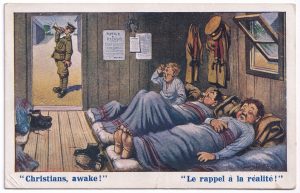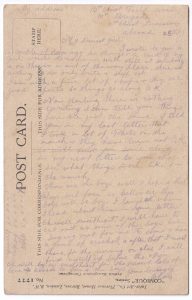[Editor: This postcard was sent by a soldier to his girlfriend, during the First World War (1914-1918). The postcard is dated 28 June 1917.]
[Front of postcard]
“Christians awake!”
“Le rappel à la réalite!”
[Reverse of postcard]
POST CARD.
[Handwritten text, in italics]
My address
16th Aust Field Amb
16th Brigade
6th Aust Division
Abroad 28/6/17
My Dearest girl,
I wrote to you a couple of days ago, so thought a card to my girl would do no harm.
Well, still at Salisbury & as this is an out of the way place, there is nothing to do, only write & sleep late.
I am with a fine lot of chaps & they are good sports, so things go along O.K.
Now darling, there is nothing exciting I can tell you. Things here are just the same.
I told you in my last letter that I took a lot of Photos on the march & they have turned out O.K. So will send you some along in my next letter, so you can see what things were like on the march.
How are the boys? Well, I hope, & that Ray’s sore face is better ere this. Boys will be boys. I laughed when I heard about him in your letter.
Oh well, sweetheart, I will have to cut out, as some of the boys are singing out for me to come & have a game of cricket, & after that I must shave for the morning, or else I will find myself up before the Major.
Oh well, bye bye sweetheart for the present. Lots of love & kisses to you & the boys.
Yours lovingly,
Chas
Yourself x x x x x x
Ray x x x x x x
Alb x x x x x x
[Manufacturer’s information:]
Inter-Art Co., Florence House, Barnes, London, S.W.
“Comique” Series. No.1777.
British manufacture throughout.
Source:
Original document
Editor’s notes:
Dimensions (approximate): 140 mm. (width), 89 mm. (height).
The writer of this postcard is believed to be Charles Fell, of the 1st Australian Convalescent Depot, born in South Melbourne (Victoria) and who lived in Stanmore (New South Wales).
See: 1) “Private Charles Fell”, Australian War Memorial
2) “Fell Charles: SERN 14810”, Discovering Anzacs [a comparison of the abbreviated signature of “Chas” on the postcard, with that of his full signature “Charles” on his Attestation Paper, shows them to be the same handwriting]
3) “Fell, Charles”, Virtual War Memorial Australia
See also another postcard from Charles Fell:
Your loving Bro, Chas [First World War postcard, with photo of an Australian soldier, 28 August 1918]
16th Aust Field Amb = (abbreviation) 16th Australian Field Ambulance
Alb = an abbreviation of the name “Albert”
Amb = an abbreviation of “Ambulance”
Aust = an abbreviation of “Australia” or “Australian”
Chas = an abbreviation of the name “Charles”
ere = (archaic) before (from the Middle English “er”, itself from the Old English “aer”, meaning early or soon)
le rappel à la réalite = (French) “the reality check”
Ray = an abbreviation of the name “Raymond”
Salisbury = Salisbury Plain: a large open plateau, approximately 775 square km (300 square miles) in size, located in the county of Wiltshire (in southern England); during the First World War, Australian troops were stationed at several training camps located on Salisbury Plain; in modern times, it is used by the British Army for training, with the Army owning approximately 390 square km (150 square miles) of the area; the ancient monument of Stonehenge is located on Salisbury Plain
x = a symbol for a kiss (depending on the circumstances, it may indicate a loving kiss, a familial kiss, or a friendly kiss)
[Editor: For ease of reading, the original text has been separated into paragraphs, and punctuation has been inserted as deemed appropriate.]
[Editor: Changed “this is a out” to “this is an out”; “a lot of Photo” to “a lot of Photos”; “by by” to “bye bye”.]


Hello Editor. I have left you alone for quite a while. Thanks for these postcards and their transcriptions. I have a quibble with your final ‘insertion’ in this transcription. You have inserted “[Thanks] …. for the present. I feel that this is not needed, and that it completely alters the meaning. On my reading, the author is saying: “by(e) by(e) for the present” — that is: good-bye for now/for the moment/until my next letter, etc. What do you think? Cheers. Raymond.
Hi Raymond, it’s great to have your input again!
Thanks so much for your observation.
It was assumed that a word was missing there, but no — you are absolutely correct. Yes, the text is saying “bye bye sweetheart for the present” (i.e. “bye bye sweetheart for now”).
Well spotted. So glad you’re here to spot mistakes.
(Of course, it would be far better if no errors were made in the first place, but these things happen, I suppose.)
How lovely to see a postcard from my great uncle to his wife Elsie and sons Raymond and Albert. A real joy and amazing that they have been preserved. Thank you
Pauline
Pauline, how great is that?
It’s incredible that you should find this postcard on the net, what with your close connection to the card’s writer.
It just goes to show what a wonderful thing the internet can be, not only bringing people together, but connecting us with our own history.
KB
Hi, I’m Pauline Graves’s (see email dated 14 April 2022) cousin and we’re researching and writing about our five great-uncles who fought in WWI, of which four returned. At the start of our project, we knew very little about Charles Fell. With the power of the internet, our knowledge of him has grown and his story will be included in our book titled:
SOLDIERS IN WWI from the Donaldson and Handley Families
After the death of Elsie in 1934, his first wife and sweetheart, he married our great aunt, Minnie Donaldson, in 1937 and had another son, Ian. Chas died on the Gold Coast in 1975 at the age of 84.
To Pauline Graves,
Hi my name is Janis I recently came across the Institute of Australian Culture website which I have not seen before, and saw you were doing research about your great uncle Charles Fell.
I was so excited to see this as I am Charles’ granddaughter (Albert Fells’ daughter)
I do have a little information about Charles I’m sure you would be interested in seeing.
I have the papers from the national archives which you probably have also obtained.
I also have 2 original Christmas cards which Charles sent from overseas back to his family still in excellent condition.
I only have one photo of Charles in his latter years. It was great to see the posed photo of him in his uniform next to the chair I have not seen that one before.
Not sure how I can contact you if you are interested in the little information I have.
Ian Fell (Charles’ son) only passed away recently 7/9/2021 I think he was 71.
Hope to hear back from you
Janis
Hi Janis,
Do you give permission for your email address to be passed on to Pauline Graves and Lisle Gorham, so the three of you can be in contact?
Hello Janis
My goodness how unbelievable to be in touch with you.
I am the great niece of Charles’s second wife Minnie Donaldson.
I am writing a book on the Donaldson family which has grown into three books, one of which is the story of our five great uncles who went to WW1. Charles is one of them. Hence my interest in the Christian’s Awake post card.
Apparently a box of his paperwork was dropped into the Annesley Antique Shop in Brisbane. I would love to know by whom. They would have to be a family member surely?
I remember Charles. He was always very dapper and always had a cigarette going.
My email is paulinegraves6@gmail.com
Please do get in touch. I would be so excited to swap information with you. Before I found the postcard his story was only five pages and since then it has tripled!
My cousin – who is editing the books – will be delighted at your popping up unexpectedly.
Hopefully you will be able to fill in some of his early life for us and of course we know nothing of his two sons beyond 1934.
So exciting. I look forward to hearing from you soon.
Pauline